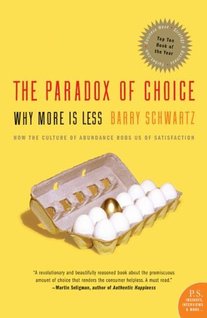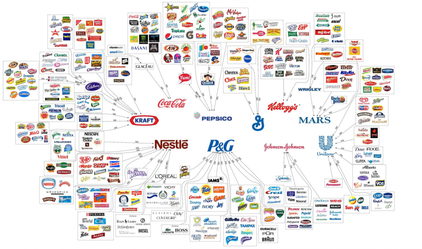
"Choice is essential to autonomy, which is absolutely fundamental to well-being."
- Barry Schwartz from
Paradox of Choice: Why More Is Less
Barry Schwartz's The Paradox of Choice: Why More Is Less is a great and easy read for those studying or just interested in the field of Marketing. This text was required reading for my Consumer Behavior course as it is relevant to every aspect of the consumption patterns of consumers. Schwartz's overall argument is that the elimination of consumer choice will reduce anxiety during the shopping experience - in essence, the more choices, the less happiness. This TED Talk from Schwartz himself offers a brief introduction to the text:
Everyone is a consumer and everyone must make choices, big or small. However, the multitude of choices in this world can oftentimes complicate the simplest of decisions. Paradox of Choice helps you critically look at consumer choice, presents issues that you probably wish you weren't aware of, and allows you to identify your own consumption patterns and behaviors - personally, it completely changed my outlook on the shopping experience, which can be both a good and bad revelation.

The Illusion of Choice
Schwartz presents the issues that consumers are faced with when it comes to consumer choice then offers solutions to overcome these issues. He also analyses the relationships between choice, expectations and happiness, which are his most compelling arguments in Paradox of Choice. However, it is perhaps his introduction and explanation of the terms maximizer and satisficer that I found the most interesting of the entire text as well as the most relevant to my own life as a consumer. A maximizer is someone who must be sure that they are making the best purchase or the best decision possible after comparing all of the alternatives. A satisficer is one who settles for "good enough" and is not worried about the possibility of a better alternative. In this post, I compare my own maximizing habits with perfectionism, which Schwartz believes are related but not synonymous.
A few comments that I have about Paradox of Choice are that it tends to be repetitive of Schwartz's overarching argument as the text progresses and due to its 2004 publication date, some of the examples are rather outdated. However, the main themes are still entirely relevant, so it helps to put these into context by applying them to goods and services found in the present-day. Overall, Paradox of Choice is a quick and easy read and I suggest that anyone interested in, studying, or working in the field of Marketing should definitely check it out.
A few comments that I have about Paradox of Choice are that it tends to be repetitive of Schwartz's overarching argument as the text progresses and due to its 2004 publication date, some of the examples are rather outdated. However, the main themes are still entirely relevant, so it helps to put these into context by applying them to goods and services found in the present-day. Overall, Paradox of Choice is a quick and easy read and I suggest that anyone interested in, studying, or working in the field of Marketing should definitely check it out.
 RSS Feed
RSS Feed